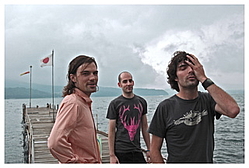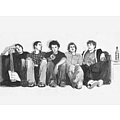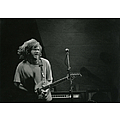Contemporary avant-rock trio The Slip formed when bassist Marc Friedman and brothers Andrew Barr and Brad Barr (Drums and Guitar/Vox, respectively) moved to Boston together after graduating from high school, where they had met and first began playing music as a group. In 1996 the trio of recent Berklee dropouts put out their first studio album and began establishing a dedicated fan-base through relentless touring in and around the northeast. A late-nineties blend of extended roots pop compositions and experimental rhythmic approaches, the band developed and found their sound through an extremely supportive local scene of artists, musicians, and actors, coupled with a rigorous, and – soon – national, tour schedule. An eclectic new brand of exploratory roots psych-rock emerged; Van Morrison meets Keith Jarrett meets Talking Heads. By 2001, the band’s tour schedule had brought them to sold-out headlining shows at NYC’s Bowery Ballroom, successful tours in Japan, and a record deal with Rykodisc. While the band’s line-up remained consistent throughout the next few years on the road, their sound developed considerably and the instrumentation expanded radically. The Slip grew from young, earthy avant-gardes to strong, mature contemporary-rock composers, creating a new sonic landscape that drew equally from Can, U2, and new interests like Built to Spill and Postal Service. By 2003, the trio’s non-stop touring produced Alivelectric and Aliveacoustic, a companion live set that also represented the inaugural release of their own independent record label, 216 records. Aliveacoustic presented a rustic and intimate, voyeuristic snapshot of the band unplugged, on a rainy night at the intimate Club Helsinki in the Berkshire Mountains. Equal parts Wilco, My Morning Jacket, and 12 Golden Country Hits – era Ween, the album contains a tender honesty that carries through from tent-revival stomps to humble and dusty lyrical psalms. Alivelectric, on the other hand, is almost exclusively instrumental, with a deep resonance and a wide breadth of analog and digital effects. Culled from an equally wide array of performances throughout the U.S. during the fall of 2002 and the summer and spring of 2003, Alivelectric gave 216 a chance to showcase the band at its grander, more expansive and ethereal live moments. The album presents an articulated side of The Slip much closer to Do Make Say Think, Tortoise, electric Bill Frisell and Squarepusher albums than the dusty americana present on it’s companion release. These two records represent the most coherent articulation of the bands’ distinct sides to date, and have sold a combined 14,000 copies so far. The band has sold a total of over 50,000 albums independently. In the five years following their last studio release, the band has also spent more and more of their time off the road in their home studios, gradually honing a new and innovative approach to recording and distilling an overall songwriting vision. So pervasive a transformation has occurred that The Slip have even recently been accused - perhaps appropriately - of ‘changing everything short of their name’. Coming out of this, their heaviest state of growth and development in years, the band entered Q-Division Studios in March 2005 and began six months of utterly focused work with co-producer Mathew Ellard. The result is their 4th studio album, Eisenhower which stands as the most cohesive and evocative work the band has put together thus far. Showcasing the raw analog passion of Broken Social Scene, the accessible melodic songcraft of Mojave 3, and the lush soundscapes and wash-like textures of Mogwai, the album’s dynamics also range from Iron And Wine–style intimate vocal immediacy to the thunderous big-beat anthem-sincerity of The Flaming Lips, with enough room in between for haunting vocal melodies evocative of Antonio Carlos Jobim or Sigur Ros laid over with sparce, raw, Notwist-style live percussion. It is the band’s finest work to date Already proving itself be a very good indication of a brilliant upcoming album, the first single that has been released - “Even Rats” – that has been released (on most digital services) has already been featured in the extremely successful Playstation2 game Guitar Hero and was also chosen to be one of only ten songs preloaded on the new SanDisk mp3 player - 4.5 million of which are set to ship in mid-march 2006. The album also contains a revamped version of “Children of December,” the demo version of which was awarded the 2004 Heineken USA/ASCAP Foundation Grant for Best Pop/Rock Song in Boston. The spring of 2005 also saw the band spin through the northeast, accompanied by Nathan Moore on vocals and guitar, as collective avant-folk band Surprise Me Mr. Davis; a modern alt-country super-group combining the raw and intimate vocals of a Tom Waits or a Nebraska-era Bruce Springsteen with the bluesy grit of The Black Keys, The Band or Two Gallants, all layered with the lush 3-and-4-part harmonies and dirty instrumentation of TV on the Radio. Selections from a late summer Montreal recording session formed a well-received EP entitled Only in Montreal. 2005 of course also saw The Slip playing a considerable amount of shows as themselves - throughout the U.S., Japan, Canada, and Mexico - and closed out with a memorable northeast New Year’s run supported by friends Apollo Sunshine. The band continues to write new music and tour. "Eisenhower" is out now.


















